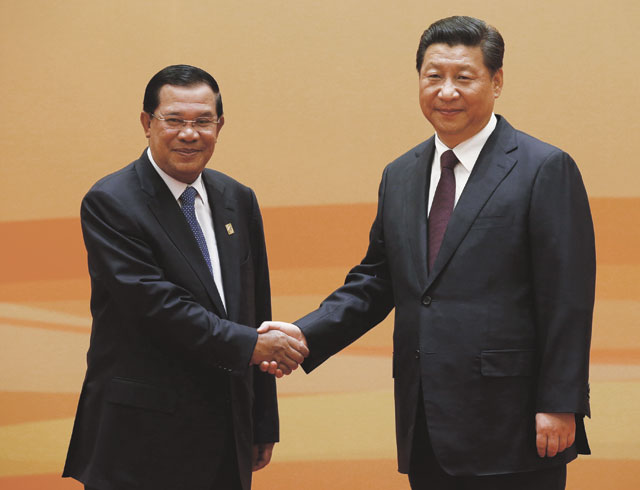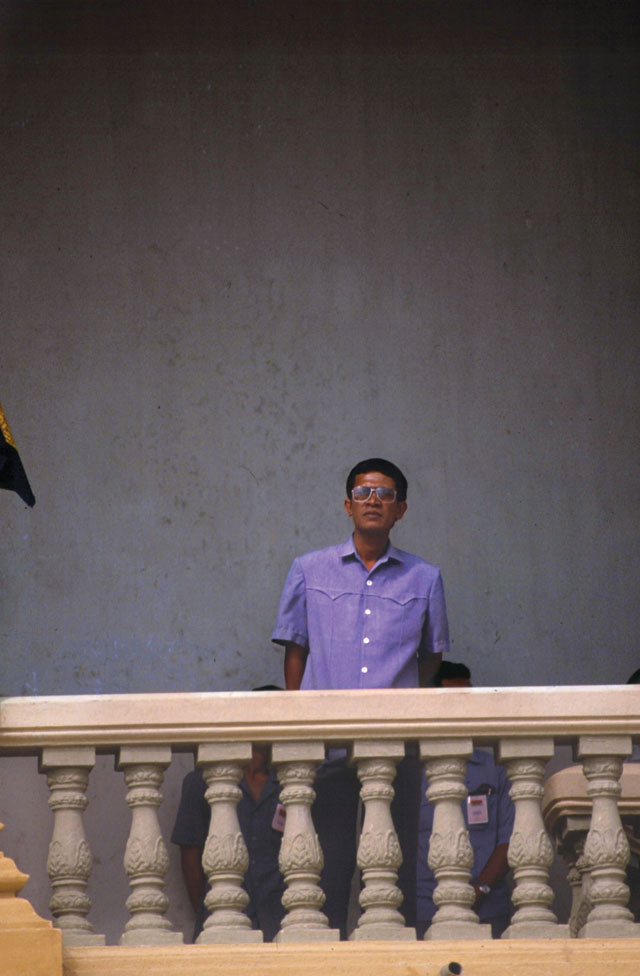Although still in office, Hun Sen has already become a historic figure. His formative influence on his nation and its people cannot be disputed, although his legacy is certainly less clear cut: many observers, especially of Western origin, have labelled him a ruthless dictator; others point out his achievements after years of war and genocide.
Hun Sen’s remarkable career and talents are often swept under the carpet. Born in 1952, he joined the Khmer Rouge when he was just 16 and rose quickly through the ranks. He was a deputy regimental commander when he escaped the regime’s internal purges by moving to Vietnam in 1977, and just 18 months later – after the Vietnamese defeated the Khmer Rouge – he became Cambodia’s youngest ever foreign minister. In 1981 he entered the top circle of the new regime as deputy prime minister and a member of the National Assembly.
In a society in which elderly people are afforded great respect, it seems impossible that the promotion of a young Hun Sen – who lacked higher education – was based solely on good fortune. During this period, he certainly made use of his outstanding ability to find powerful allies, forge interpersonal networks and isolate opponents. In December 1984, following the death of Prime Minister Chan Si, Hun Sen immediately took over most official duties before being officially elected by the National Assembly to become the new prime minister of Cambodia the following month. The 32-year-old became the youngest head of government in the world.
It is important to remember the perilous state in which Cambodia found itself at this time. As well as the tremendous destruction meted out by the Khmer Rouge, the group continued a civil war from their strongholds near the Thai border. Apart from mostly communist states, Cambodia was isolated from much of the world.
As such, Hun Sen started his new job with two main policies: the centralisation of political decision-making processes and the decentralisation of the economy. Compared to many of his comrades, Hun Sen was not bound to socialist ideology. In fact, he was known as a flexible pragmatist. Together with Prince Norodom Sihanouk, who represented the Coalition Government of Democratic Kampuchea, Hun Sen was the driving force in the reconciliation process that ended in the 1991 Paris Peace Accords.
However, following the collapse of the Soviet empire after the fall of the Berlin Wall in 1989, the Phnom Penh regime stood on the precipice. To contain hyperinflation and avoid national bankruptcy, Hun Sen initiated the privatisation of huge public assets. As a result, he not only ensured the loyalty of civil servants and soldiers, he also rose as the dominant force in Cambodia. Suddenly, many of his followers – and former opponents – became rather wealthy. At the same time, they became ever more dependent on the prime minister, the one and only Cambodian patron. During the same period he built up the trademarks of his unique leadership style – highly personalised, strictly hierarchical and enrichment-orientated – that have remained in place ever since. Most importantly, with the new wealth he could afford a private army that has been the backbone of his power for the past two decades.
When the country’s first post-war free elections took place in 1993, Hun Sen’s Cambodian People’s Party (CPP) lost the UN-sponsored ballot to the royalist Funcinpec Party. After applying enormous pressure, Hun Sen somehow wrested a coalition government from the jaws of defeat and became the official second prime minister. However, it became increasingly apparent that Hun Sen was not willing to play second fiddle, and he achieved his goal in 1997. In a new wave of violence conducted by his troops, he destroyed the political pillars the royalists stood on. The bloody coup that July lasted only three days, but it cost dozens of his political opponents their lives.
The rest of the story is quickly told: Ruling by fear has become the predominant strategy, politically motivated violence has decreased but has been replaced by judicial repression. Hun Sen has sidelined all of his opponents, either by embracement or his notorious iron fist. Ingenious marriage strategies have ensured the loyalty of high-ranking officials within the national police and the government. Close associates, often hiding behind a relative who acts as a figurehead, have become leading businesspeople with direct access to public contracts and concessions. The kickbacks have led to many politicians becoming the richest individuals in Cambodia, although Hun Sen has played the principle of divide and rule to perfection: Nobody in his circle of power can accumulate enough resources to overthrow him.

In many respects, Cambodia resembles a feudal state with personal relations as its hardest currency.
Today’s Cambodia under Hun Sen is a society deeply divided into rich and poor. It exhibits a remarkable combination of turbo capitalism and corruption that exists without any aspects of a meritocracy or real promotion prospects for millions of people. In many respects, Cambodia resembles a feudal state with personal relations as its hardest currency. This machine works mainly due to the largely unquestioning acceptance of the established hierarchy and the unwritten laws of the sophisticated patronage system with Hun Sen and his wife, Bun Rany, at the top.
Together, Cambodia’s power couple have effectively created a cartel that is cut off from the outside world. Its members have access to revenue with almost no effort or service in return. Sufferers are not only the vast majority of the people, but also the country’s natural resources. In such a political environment, most attempts to establish ‘good governance’ are doomed to fail.
Fortunately, after years of political apathy, the events of 2013 have shown that Cambodians have finally found the courage to protest against the country’s injustices. Furthermore, they have begun to connect these failures with their leader. The frustration of many Cambodians is profound – once upon a time, Hun Sen’s rule was far more comfortable. Now the big question is how he will adapt.
The dilemma is that it appears impossible to renovate a regime that was created to ensure loyalty, because any such change would aggravate his followers. Furthermore, the prime minister cannot expect his subordinates to display initiative – they learned to exist in the hierarchy without any notion of responsibility to the public. As far as they are concerned, their job is to wait until their superiors tell them what to do.
Therefore, by reforming his own system, Hun Sen runs the risk of losing the basis of his power. It is a huge challenge. The concessions he made to satisfy the opposition Cambodia National Rescue Party (CNRP) could have the weight to establish the country’s first truly fair and competitive election since 1993. Without any major adjustments to his party, are Hun Sen and the CPP attractive enough for voters? One has to assume it will be very difficult for the party to win genuinely free and fair elections in 2018.
The last chapter, of course, is by no means written. Nobody should make the mistake of underestimating Hun Sen’s ability to cling to power. It may be his biggest burden that he has not known how to escalate his power for the past 15 years. Of course, one can recognise clear dynastic ambitions, but that cannot be the only stimulus for ruling a country. So what does he have in mind? Will he fight to retain his power in the strictest sense of the word? Hun Sen knows that no reign lasts forever – but historical recognition does.


